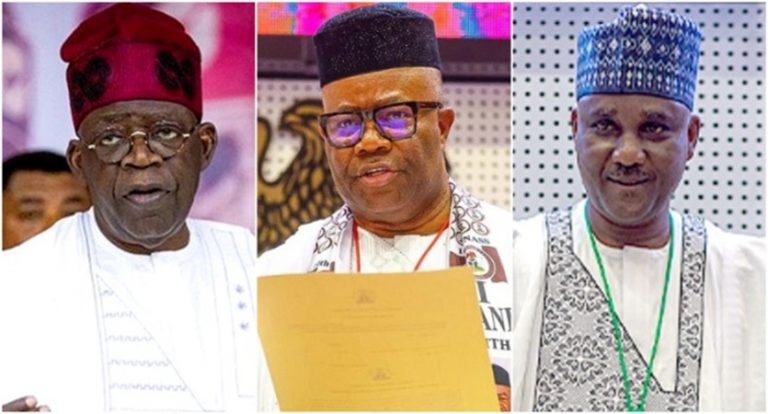
Nigeria’s National Assembly moved quickly on Thursday to endorse President Bola Tinubu’s controversial emergency rule in Rivers State, despite mounting opposition, raising new concerns about the erosion of democratic principles in the country.
However, in what is now emerging as a major scandal, an exclusive report by Peoples Gazette has alleged that lawmakers were financially induced to support the emergency rule declaration.
According to the report, eleven lawmakers—comprising seven senators and four House of Representatives members—confirmed separately to The Gazette that they were offered up to $25,000 each to endorse Tinubu’s invocation of Section 305 of the Nigerian Constitution.
Register for Tekedia Mini-MBA edition 19 (Feb 9 – May 2, 2026).
Register for Tekedia AI in Business Masterclass.
Join Tekedia Capital Syndicate and co-invest in great global startups.
Register for Tekedia AI Lab.
This provision, which grants the president power to declare emergency rule, was used to dismantle democratic institutions in Rivers State, including the ouster of elected Governor Siminalayi Fubara, his deputy, and all state legislators. In their place, Tinubu installed a retired naval chief, Vice Admiral Ibok-ete Ibas, as sole administrator, effectively imposing a military-style rule over the state.
Legislature Under Fire for Alleged Executive Puppetry
The revelation of bribe payments has sparked outrage among Nigerians, many of whom already viewed the National Assembly’s decision as a rubberstamp endorsement of executive overreach. The bribery allegations have reinforced the growing belief that the legislative arm of government has ceased to function as an independent institution and is instead operating as a puppet of the presidency.
At a State House briefing on March 19, Attorney General Lateef Fagbemi defended Tinubu’s emergency rule, blaming Governor Fubara for the crisis and claiming that the intervention was necessary to maintain stability. He urged critics to petition the National Assembly if they were dissatisfied, fully aware that the legislature had already been co-opted into rubberstamping the president’s actions.
On March 20, both chambers of the National Assembly convened to consider Tinubu’s letter seeking their approval. Despite massive public outcry and legal experts condemning the move as unconstitutional, the House of Representatives and the Senate overwhelmingly voted in favor of the emergency rule.
In the House, 240 lawmakers approved the motion through a voice vote, with Speaker Tajudeen Abbas presiding. Though some amendments were made—including the creation of a committee of eminent Nigerians to mediate the crisis—the decision to uphold the emergency rule remained intact.
Similarly, in the Senate, 109 senators also gave their nod to the controversial decision, invoking their constitutional powers to approve the president’s declaration. A joint committee of both legislative houses was set up to oversee the administration of Rivers State during the emergency period, but it is believed that this is merely a smokescreen to legitimize Tinubu’s undemocratic move.
A Further Dent to Nigeria’s Democracy
The approval of the state of emergency has been described as one of the most blatant abuses of executive power in Nigeria’s democratic history. Legal experts and political analysts have declared the move unconstitutional, arguing that Section 305 does not permit the president to arbitrarily dissolve elected state governments and replace them with appointees.
The Nigerian Bar Association (NBA), opposition parties, and civil society groups have all condemned the legislature for what they describe as an outright betrayal of democracy.
“The 1999 Constitution does not grant the President the power to remove an elected governor, deputy governor, or members of a state’s legislature under the guise of a state of emergency,” NBA said in a statement. “Rather, the Constitution provides clear procedures for the removal of a governor and deputy governor as per Section 188. Similarly, the removal of members of the House of Assembly and dissolution of parliament is governed by constitutional provisions and electoral laws, none of which appear to have been adhered to in the present circumstances.”
The approval, allegedly secured through bribes, is seen as yet another indication that Nigeria’s legislative arm exists merely to serve the interests of the executive, rather than act as an independent check on presidential power.
A senior lawyer, Femi Falana (SAN), speaking on the matter, warned that if this precedent is allowed to stand, no opposition-led state will be safe from similar takeovers in the future.
“Today it is Rivers; tomorrow, it could be any other state where the president’s party does not hold sway,” he said.
Growing Public Outrage and Fubara’s Legal Action
The decision to place Rivers State under a military-style administration is already facing legal challenges, with Governor Fubara’s lawyers filing a suit at the Supreme Court to overturn the emergency rule declaration. Political figures including Atiku Abubakar, Peter Obi, and Rotimi Amaechi have also called for the immediate reversal of the unconstitutional suspension of democratic institutions in Rivers State.
Beyond the courts, however, public anger is brewing, with some activists and opposition groups threatening mass protests against what they call a dangerous slide into dictatorship. The bribery allegations have only fueled resentment, with many Nigerians demanding a full investigation into the role of money in influencing lawmakers’ decisions.
The events in Rivers State have set off alarm bells about the future of federal-state relations, the independence of the legislature, and the survival of constitutional governance.



